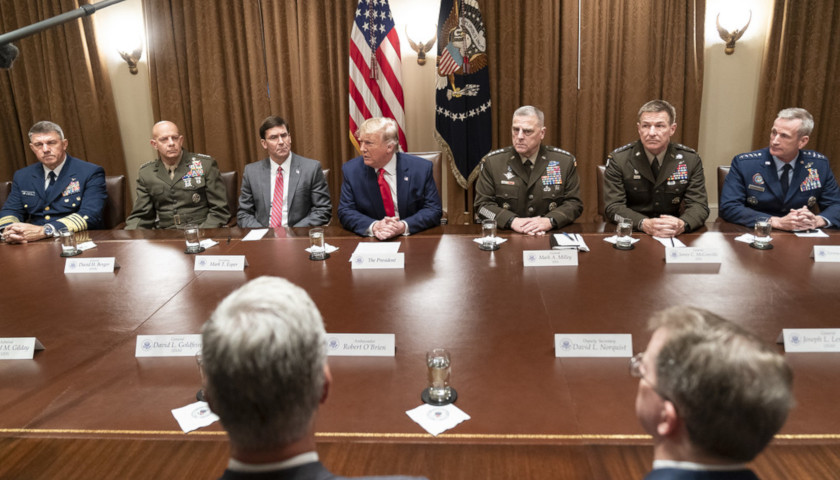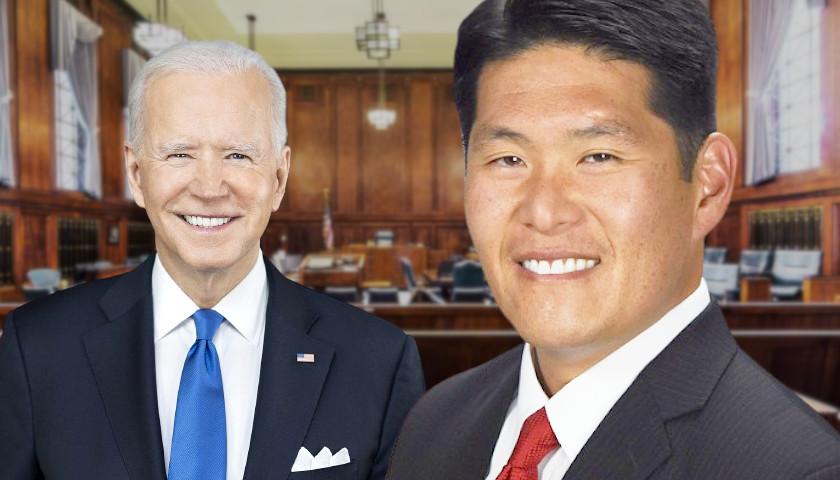by Curtis Ellis
Beware of the blob.
That’s either a kitschy Burt Bachrach tune from the 1950s, a warning about Washington’s permanent foreign policy establishment, or the takeaway from watching witnesses in the impeachment hearings.
At one time, the State Department was accused of harboring secret Soviet spies, à la Alger Hiss.
Today, the harbor is filled with globalists, and they are quite open about their efforts to subvert President Trump’s foreign policy.
His America First agenda not only conflicts with the species of globalism that is an article of faith in elite Washington, it takes foreign policy off the autopilot setting that it’s been on for decades.
And that maybe his greatest offense in the eyes of the foreign-policy establishment.
Let’s go to the videotape.
The first public witness in the impeachment hearings was George Kent, a deputy assistant secretary of state for European affairs.
Kent spoke of “how we have defined our national interest broadly in Europe in the past 75 years,” and the fundamental importance of “the collective security provided by NATO.”
He talked about the “rules-based international order” created after World War II.
The Ukraine chargé d’affaires Bill Taylor summed up: “the whole notion of a rules-based order was being threatened by the Russians.”
These honorable and capable men displayed an element of excellent students who’ve memorized all the facts if not grasping their meaning, adept at following whatever map you give them but not at drawing a new one for unfamiliar territory.
One can’t escape feeling that what these diplomats feared most was not a column of Russian troops marching into Crimea and Ukraine, but the march of time overtaking their comforting yet outdated concepts of the world. Who moved my cheese?
Kent gave away the true nature of the game when he said, “Ukraine is on a path to become a full security partner of the United States within NATO.”
This was asserted, and accepted, as fact—“settled law”—though it’s unclear who made the decision to oblige us to be willing to go to war in Ukraine against a nuclear-armed Russia. The president? Congress? Did we miss the debate?
In addition to arrogating to themselves the power to make foreign policy, the foreign-policy establishment engages in a paint-by-numbers exercise when it comes to making policy. No inspiration, no original thinking, no attempt to reflect reality, just follow the outlines laid down by someone else before.
These experts were taught NATO defended “free Europe” from “Russian aggression” when Soviet tanks were ready to drive through Germany’s Fulda Gap in the 20th century. Therefore, expand NATO up to Russia’s border in the 21st century.
Kent testified how “a Europe truly whole, free, and at peace” has been “our strategic game for the entirety of my foreign service career.”
So he and his fellows in the foreign policy establishment push for a united Europe even as Britain, Hungary, Italy, Greece, and Catalonia bristle at Brussels’ centralized power.
We see this copy-and-paste mindset at work time and again.
A 1947 U.N. resolution declared Jerusalem would be an international city administered by the United Nations. For seven decades, official U.S. Middle East policy perpetuated this fantasy even as it became obvious the U.N. couldn’t manage a one-car funeral and Israel would never surrender Jerusalem as the eternal capital of the Jewish people. President Trump recognized that reality and moved our embassy to Jerusalem over the dire predictions and objections of the “foreign policy professionals.”
The “experts” welcomed China into the “rules-based international order” on the premise this would turn that Communist tyranny into a democratic ally. Toward that end, we shared scientific research as well as extended development loans and Peace Corps missions. These continued, some to this day, even as Beijing grew more hostile and authoritarian.
Such is the track record of the foreign policy professionals we’re told not to question.
Which brings us to a separate though related matter.
Just as we can’t second-guess our foreign services, we’re told questioning our intelligence services is tantamount to treason.
Let’s look at their track record.
They failed to predict the Communist victory in China in 1949. The fall of the Shah of Iran? Missed that one, too. The collapse of Soviet Union? Didn’t see it coming. The 9/11 attacks? A total surprise. Weapons of mass destruction in Iraq? They were sure we’d find them. The migration crises following the overthrow of Libya’s Qaddafi and the Syrian civil war? Oblivious. Red China’s ongoing penetration of industrial, military, and government computer networks? They continue to miss it.
With a record like that, one must ask: What are we paying these people for and why should we regard them as any less fallible than other people?
Since he first descended the escalator in Trump Tower to declare his candidacy for president, Donald J. Trump has exposed the mendacity that permeates our political discourse. Politicians mouth poll-tested talking points and the media pretends to believe them.
President Trump earned the ire of the establishment by espousing an America First agenda that rejects the primacy of a “rules-based rules based international order” with its religious devotion to free trade.
He challenges the transnationalist mindset that says Washington should pursue what’s good for the global economy rather than what’s good for America.
But his greatest offense against the establishment is not ideological.
President Trump has unmasked the groupthink that passes for wisdom in official Washington.
The Wise Men and their progeny take that as a personal insult. Too bad.
– – –
Curtis Ellis is policy director with America First Policies. He was also a senior policy advisor with the Donald J. Trump presidential campaign in 2016.






I share some of your concerns about globalist foreign policy. The fact that Truman wanted a Europe-centered foreign policy did not keep him from intervening into a disasterous civil war on the Korean Peninsula by 1950 (just as it did not prevent the placement of occupation troops on the southern half of that peninsula between 1945 and 1949). Indeed, Truman, in order to get his Europe-centric U.S. rearmament in the summer of 1950, he had to trick the Asia-first politicians who controlled Congress at that time to support a huge military buildup by tricking these conservatives into thinking that his new ground troops, weapons, bases, and appropriations would all go to East Asia instead of to N.A.T.O. Western Europe. But, once he got his new draft call-ups and weaponry, especially after September of 1950, most of those new weapons and draftees went to Europe instead of to Asia, thereby causing a series of bruhahas known as the “Great Debates” that occurred from the Fall of 1950 well into the Spring of 1951 that would also culminate in MacArthur’s firing.
The Europe- and Asia-firsters had their own reasons for supporting our first Vietnam-like quagmire on the Korean Peninsula from 1950 to 1953: the Europe-firsters used the Korean Conlfict to trick Republicans into approving a huge military build up by leading these conservatives to think that the new soldiers and appropriations would go into having an outright war with Mainland China. Once they got most of their troops and appropriations, they used the new buildup to chiefly act as an ignition key to N.A.T.O. with U.S. ground troops at the rear and European ground troops at the front of N.A.T.O. The Asia-firsters, for their part, supported the Korean War that they hoped they could use as a launching pad to overthrow the Chinese communists.
This would lead to the unweildly and unnaccountable military (eumphamistically called the defense) buildup that continues to haunt us today with its undermining of Congressional oversight and runaway budgets.